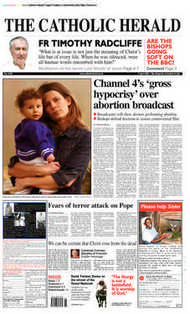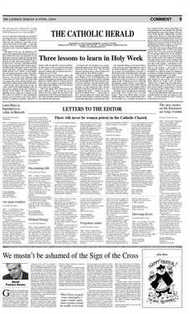Page 5, 9th April 2004
Page 5

Report an error
Noticed an error on this page?If you've noticed an error in this article please click here to report it.
Tags
Share
Related articles
Burm' Ese Ring Of Res
`in 10 Years All Karen Will Be Dead'
Premier Oil Gets Tough As Battle Goes To War Over Burma
General Ne Win's Violent Kingdom
Asia
Christian children forced to convert to Buddhism in Burma
Richard Chilvers reports on the human rights abuses committed against Christians by the Burmese junta CHILDREN from Christian families in Burma between the ages of five and 10 have been lured from their homes and placed in Buddhist monasteries.
Their heads are shaved and they are trained as novice monks, never to see their parents again.
In a visit to Chin and Kachin refugees in New Delhi and Mizoram State, India, Christian Solidarity Worldwide (CSW) heard accounts of cultural genocide and religious persecution and discrimination.
Burmese forces offer incentives to impoverished villagers to convert from Christianity to Buddhism in Chin state, an area which is 90 per cent Christian.
Mountain-top crosses have been destroyed and villagers forced to build Buddhist pagodas in their place, often having to contribute finances and labour. Christians are required to obtain permits for special events, and for any renovation or construction work. No permission for new church buildings has been given since 1994. Christians in the civil service are discriminated against, and no Christian can rise beyond the rank of major in the regime’s army.
In addition to overt religious persecution, the junta — the State Peace and Development Council (SPDC) — has adopted a deliberate policy of introducing crude alcohol to Chin State.
The Chin culture forbids alcohol, but the SPDC has brought in large quantities of methylated spirits or industrial alcohol, which it sells cheaply to teenagers and young parents, especially on Sundays. Medical effects include addiction, jaundice, toxic liver failure and damage to brain cells, in some cases leading ultimately to death. One Christian told the CSW delegation: “It causes the breakdown of body, mind, spirit and society.” Forced labour, a serious human rights violation, occurs “on a daily basis”, often disrupting church and community activities. CSW received a copy of a recent letter from an SPDC commander to a village headman dated December 13 2003, demanding 40 porters from one village and 30 from another. In another area of Chin State, villagers were forced to porter from December 20 2003 until January 19 2004, and were therefore unable to celebrate Christmas and New Year in their communities.
The visit was conducted jointly by CSW-UK and CSWAustralia. CSW is one of only a handful of international organisations to visit the Chin and Kachin. One Chin refugee told the delegation: “Many foreigners go to Burma’s eastern border in Thailand, but until now no one has come to us. We used to pray for foreign NGOs to come to the western borders, and we used to weep when no one came.” AKachin refugee said: “It is true that we feel we are known by no one.” The chairman of the Chin National Front said: “Your coming here is a godsend.” CSW is calling on the international community to respond to these reports of human rights violations in western Burma, which add to the catalogue of evidence of atrocities perpetrated throughout the country by the junta. “The forgotten Chin and Kachin peoples of Burma urgently need their voice to be heard,” said Baroness Cox, a deputy speaker of the House of Lords and CSW-UK’s Honorary President, who led the delegation to India.
“We appeal to the international community to increase pressure on the regime to stop its policies of ethnic cleansing, religious persecution, cultural genocide, forced labour and torture. We also urge other international non-governmental organisations currently providing humanitarian assistance on the Thai-Burmese border to consider taking up the plight of the refugees and internally displaced people in the western regions of Burma, too.” FAMOUS FOR its buildings and streets carved out of a mountainside, the southern Italian city of Matera has entered the world spotlight as the setting for Mel Gibson’s film, The Passion of the Christ.
Now city officials and some residents want to take advantage of the movie’s multimillion-dollar success to capture the kind of publicity and attention they feel the city deserves. “Gibson’s movie can be a huge advertisement for Matera,” said Luca Gagliardi of the city’s tourism department.
The city’s ancient “sassi” or rock-hewn neighbourhoods have been on the UN World Heritage List since 1993, but the city has not drawn the tourists seen in Italy’s other cultural meccas, like Florence or Rome. Because the city’s historic centre poses a striking similarity to what Jerusalem may have looked like 2,000 years ago, Gibson chose Matera as a backdrop for several important outdoor locations. “We are using the success of the film to promote our city,” Mr Gagliardi said.
In early February, two travel agencies in Matera started to offer online “The Passion Tour”. Visitors can buy a weekend or weeklong package that takes them to all the sites Gibson used to shoot scenes of the Last Supper, the Way of the Cross and the Crucifixion.
The package price varies according to the type of accommodation, which includes the city’s carvedin-the-rock hotel or the more modern hotels where Gibson, his cast and crew were lodged. “The majority of inquiries have come from the United States,” said Francesco Foschino, the man behind the tour.
“The first group coming is from the States, and they’re arriving for Easter. We’ve also had a priest from Ireland ask for information to see if he can bring about 40 parishioners with him.”
blog comments powered by Disqus















